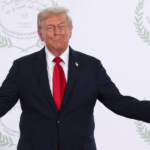The US Supreme Court’s just-completed term had a clear winner: President Donald Trump.
“The court treated him as if he were a normal president, and I think that was probably a mistake,” said Kermit Roosevelt, a professor who teaches constitutional law at the University of Pennsylvania. The court has yet to grapple with “what to do with the president who does not seem to be motivated by public spiritedness or the good of the country and doesn’t necessarily subscribe to American values like due process and liberty and equality.”
The ruling Friday gives the administration a new tool to try to stop judges from putting policies on hold. Writing for the majority, Justice Amy Coney Barrett faulted three trial judges for issuing so-called nationwide injunctions halting Trump’s plan to restrict automatic birthright citizenship.
“Federal courts do not exercise general oversight of the executive branch,” said Barrett, one of three Trump appointees on the court.
Trump, who thanked by name the six Republican-appointed justices in the majority, declared the decision a “monumental victory.” He said the administration would move to lift holds judges have placed on a number of his policies, mentioning fights over refugee resettlement, federal spending and so-called sanctuary cities.
“The Supreme Court has finally put a stop to this judicial activism, which has abused our constitutional separation of powers for too long,” Alabama’s Republican Attorney General Steve Marshall said in an emailed statement.
The court on Monday and Thursday will likely indicate new cases the justices will hear in their next nine-month term, which will start in October.
“This ruling was particularly significant because it showed the court’s willingness to enforce constitutional constraints even on immigration enforcement — typically an area where the court defers strongly to executive authority,” said Stephanie Barclay, a professor who teaches constitutional law at Georgetown Law School.
The birthright citizenship case didn’t directly concern the legality of the restrictions, which would upend a longstanding constitutional right. Trump seeks to jettison what has been the widespread understanding that the Constitution’s 14th Amendment confers citizenship on virtually everyone born on US soil. The executive order would restrict that to babies with at least one parent who is a citizen or legal permanent resident.
The practical effect of the ruling remains to be seen. The 22 states challenging the citizenship plan can still argue at the lower court level that they need a nationwide halt to avoid the financial costs and administrative headaches that would result if the restrictions applied in neighboring jurisdictions. And Barrett explicitly left open the prospect that people challenging policies can press class action lawsuits.
A prominent critic of nationwide injunctions, Notre Dame law professor Samuel Bray, hailed the decision — but also predicted a surge of class action suits and new court orders blocking the citizenship policy.
“I do not expect the president’s executive order on birthright citizenship will ever go into effect,” Bray said in a statement.
Barrett cast the ruling as a nonpartisan one, noting that the Biden administration also sought to rein in the use of nationwide injunctions.
“It’s easy to see why. By the end of the Biden administration, we had reached ‘a state of affairs where almost every major presidential act was immediately frozen by a federal district court,” Barrett wrote, quoting from a law review article co-written by Bray and University of Chicago Law School professor William Baude.
Critics of the court said that characterization missed a key point.
“It is true, of course, that universal injunctions have bedeviled both prior Democratic and Republican administrations,” Michael Dorf, a professor who teaches constitutional law and federal courts at Cornell Law School, said in an email.
“But the court fails to recognize (or chooses to ignore) the fact that eliminating a tool for courts to rein in the executive branch is especially perilous at this particular moment, when we have an administration that is already inclined to take a casual attitude towards judicial orders.”









